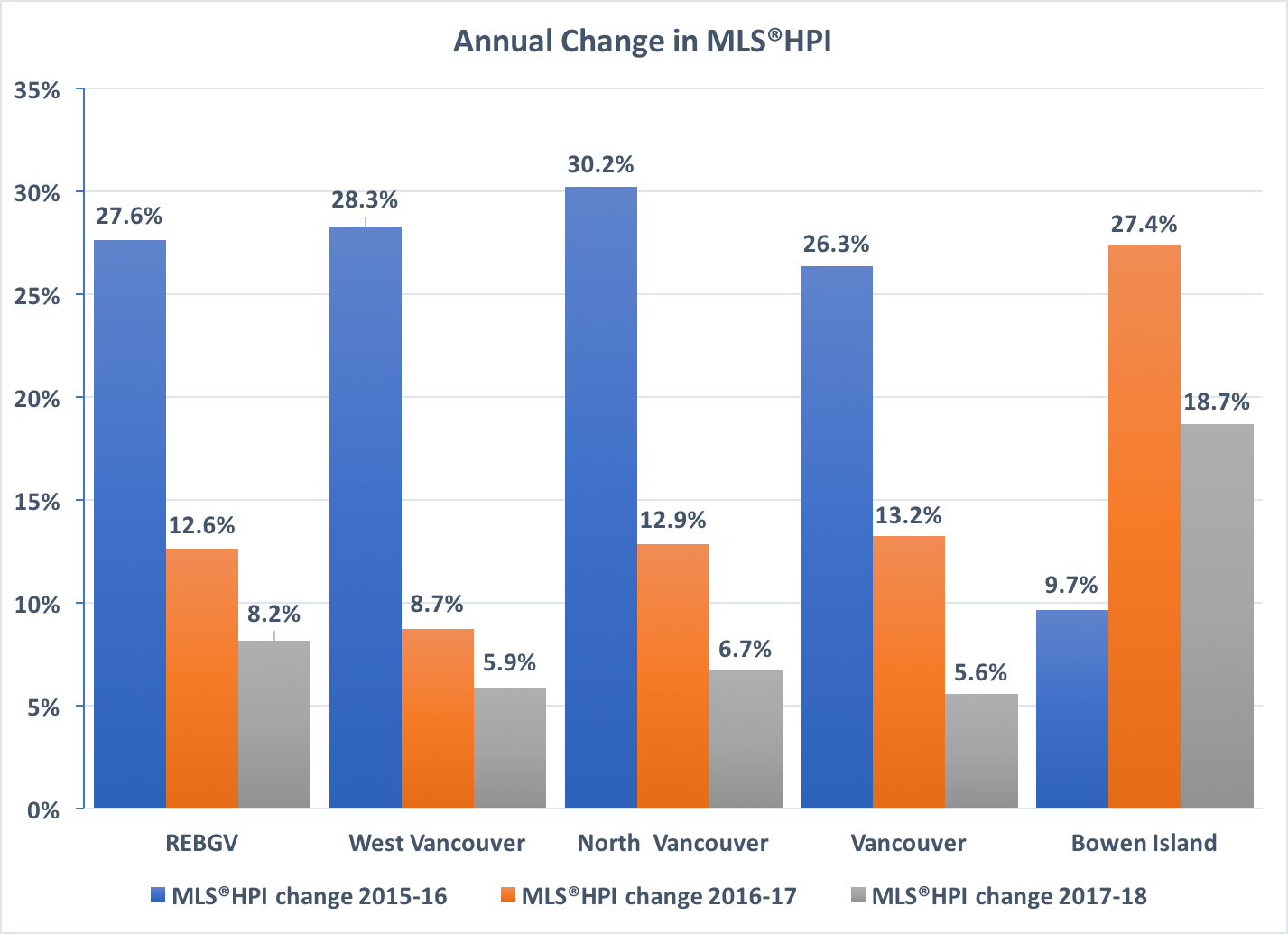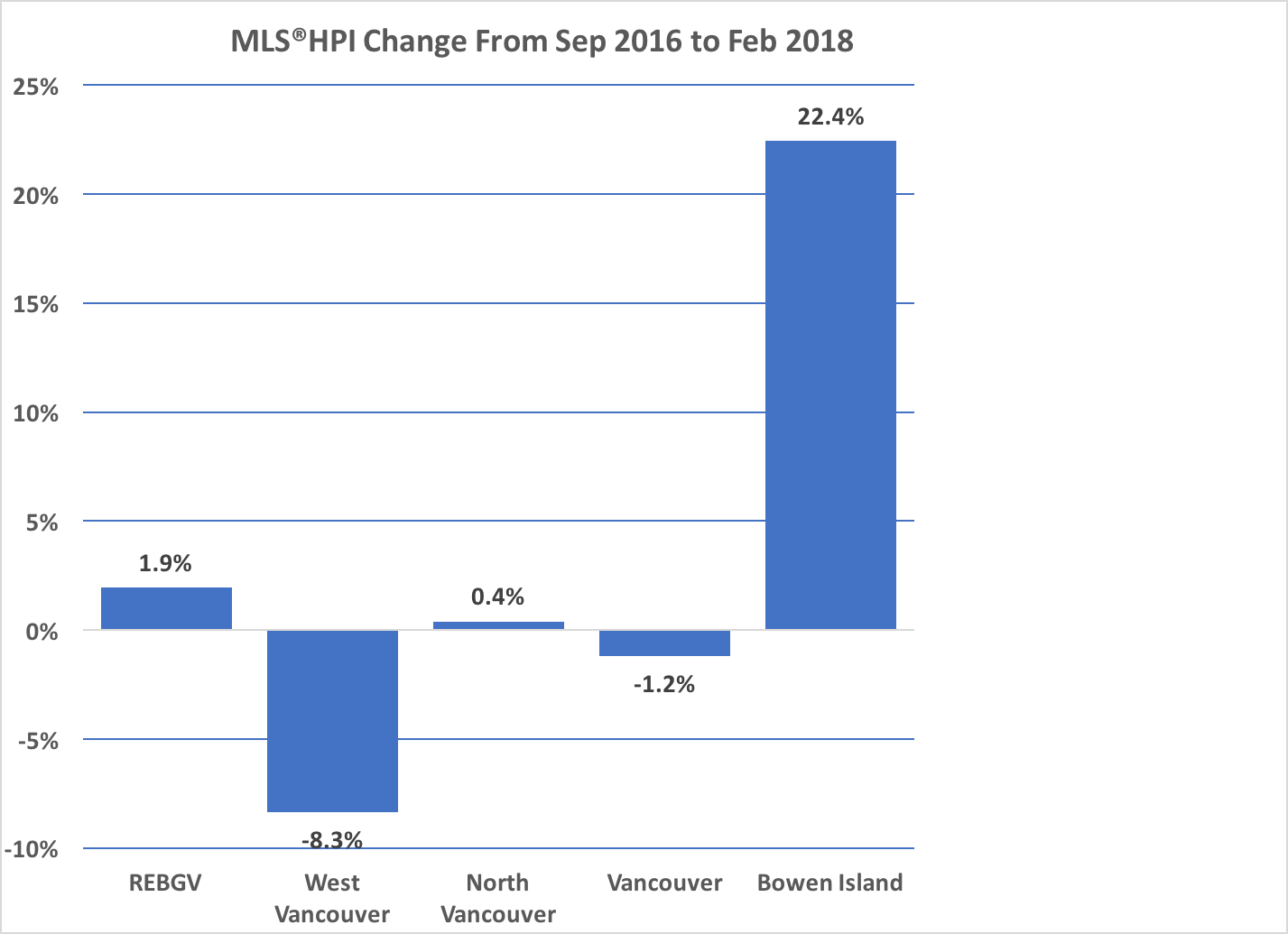In August 2016, the Government of BC implemented a Foreign-buyers Tax, a City of Vancouver Vacancy Tax, and changes to the Property Transfer Tax, in anticipation that reducing the pressure from foreign buyers on the lower mainland housing market would counter the affordability crisis.
The MLS®HPI (Home Price Index) measures the rate at which housing prices change over time taking into account the type of homes sold. Changes in the MLS®HPI from February 2015 through February 2018 provide a pci of not only how prices have risen or fallen but also the rate at which they changed.
The communities used in this comparison are the REBGV (combined results for municipalities governed by the Real Estate Board of Greater Vancouver), West Vancouver, North Vancouver, Vancouver, and Bowen Island. Data deals with detached homes only as this is currently the only category reported for Bowen Island). This comparison starts at the end of February 2015, prior to the implementation of the new taxes in August 2016, and ends at the end of February 2018.

End of February 2015 through end September 2016: The MLS®HPI rose steadily in all of the comparator communities from February 2015 until the end September 2016, increasing over those 20 months by an average of 55.7 per cent in the mainland communities, with Bowen Island the low-end outlier at 35.5 per cent.
End of September 2016 through end January 2017: The impact of the new taxes began to register after September 2016 and, by January 2017, the MLS®HPI in REBGV had fallen 5.9 per cent and West Vancouver homes lost 14.4 per cent (-$494,700). Again the outlier, Bowen Island MLS®HPI increased 4.3 per cent (+$37,200).
End of February 2017 through end February 2018: However, by March 2017, the market had stabilized somewhat and the MLS®HPI began to rise again. By the end of February 2018, the comparators, excluding Bowen Island, averaged an MLS®HPI increase of 6.6 per cent with a 18.7 per cent increase on Bowen Island. Bowen Island’s MLS®HPI increase from February 2015 to February 2016 (prior to the new taxes) was 9.7 per cent.
End of February 2018: West Vancouver and Vancouver still fall short of their MLS®HPI high of September 2016 (down 8.3 and 1.2 per cent respectively), while REBGV and North Vancouver exceed the figure by 1.9 and 0.4 per cent respectively. Again the outlier, Bowen Island has exceeded its September 2016 MLS®HPI by 22.4 per cent.

Bowen Island property owners lost significant real estate value in 2008 and recovery did not begin in earnest until 2014. An apparent lack of foreign buyer interest in island properties protected it from the very dramatic price gains in other Metro communities.
As a strategy to deal with the affordability crisis, the Foreign-buyer tax has served to slow price increases dramatically in most jurisdictions, and even reduced the MLS®HPI in areas with the most expensive real estate, but it has had no significant impact on the affordability crisis. Using taxation to create affordability was a counter-intuitive approach, and has proven less than effective. Except for West Vancouver, the MLS®HPI is equal to or higher than when the tax was implemented.
The government’s latest strategy, the speculation tax, is aimed at increasing the availability of accommodation rather than addressing affordability, and is designed to encourage owners to rent summer homes, empty homes and homes purchased for speculative reasons to long-term tenants; however, Bowen Island, along with other island communities, has been excluded from the speculation tax.
It appears Bowen Island, historically an anomaly or outlier in the Metro Vancouver market, will continue to be the exception rather than the rule going forward.
Data extrapolated from: Real Estate Board of Greater Vancouver (https://www.rebgv.org). Data deemed reliable but not guaranteed.
Published in the Bowen Island Undercurrent, 29 March, 2018, Page 9: https://issuu.com/bowen-island-undercurrent/docs/bowthu20180329
The MLS®HPI (Home Price Index) measures the rate at which housing prices change over time taking into account the type of homes sold. Changes in the MLS®HPI from February 2015 through February 2018 provide a pci of not only how prices have risen or fallen but also the rate at which they changed.
The communities used in this comparison are the REBGV (combined results for municipalities governed by the Real Estate Board of Greater Vancouver), West Vancouver, North Vancouver, Vancouver, and Bowen Island. Data deals with detached homes only as this is currently the only category reported for Bowen Island). This comparison starts at the end of February 2015, prior to the implementation of the new taxes in August 2016, and ends at the end of February 2018.

End of February 2015 through end September 2016: The MLS®HPI rose steadily in all of the comparator communities from February 2015 until the end September 2016, increasing over those 20 months by an average of 55.7 per cent in the mainland communities, with Bowen Island the low-end outlier at 35.5 per cent.
End of September 2016 through end January 2017: The impact of the new taxes began to register after September 2016 and, by January 2017, the MLS®HPI in REBGV had fallen 5.9 per cent and West Vancouver homes lost 14.4 per cent (-$494,700). Again the outlier, Bowen Island MLS®HPI increased 4.3 per cent (+$37,200).
End of February 2017 through end February 2018: However, by March 2017, the market had stabilized somewhat and the MLS®HPI began to rise again. By the end of February 2018, the comparators, excluding Bowen Island, averaged an MLS®HPI increase of 6.6 per cent with a 18.7 per cent increase on Bowen Island. Bowen Island’s MLS®HPI increase from February 2015 to February 2016 (prior to the new taxes) was 9.7 per cent.
End of February 2018: West Vancouver and Vancouver still fall short of their MLS®HPI high of September 2016 (down 8.3 and 1.2 per cent respectively), while REBGV and North Vancouver exceed the figure by 1.9 and 0.4 per cent respectively. Again the outlier, Bowen Island has exceeded its September 2016 MLS®HPI by 22.4 per cent.

Bowen Island property owners lost significant real estate value in 2008 and recovery did not begin in earnest until 2014. An apparent lack of foreign buyer interest in island properties protected it from the very dramatic price gains in other Metro communities.
As a strategy to deal with the affordability crisis, the Foreign-buyer tax has served to slow price increases dramatically in most jurisdictions, and even reduced the MLS®HPI in areas with the most expensive real estate, but it has had no significant impact on the affordability crisis. Using taxation to create affordability was a counter-intuitive approach, and has proven less than effective. Except for West Vancouver, the MLS®HPI is equal to or higher than when the tax was implemented.
The government’s latest strategy, the speculation tax, is aimed at increasing the availability of accommodation rather than addressing affordability, and is designed to encourage owners to rent summer homes, empty homes and homes purchased for speculative reasons to long-term tenants; however, Bowen Island, along with other island communities, has been excluded from the speculation tax.
It appears Bowen Island, historically an anomaly or outlier in the Metro Vancouver market, will continue to be the exception rather than the rule going forward.
Data extrapolated from: Real Estate Board of Greater Vancouver (https://www.rebgv.org). Data deemed reliable but not guaranteed.
Published in the Bowen Island Undercurrent, 29 March, 2018, Page 9: https://issuu.com/bowen-island-undercurrent/docs/bowthu20180329